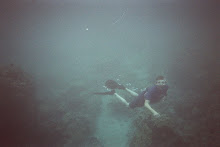Say Hello to Archilochos:
Greek Poet of the 7th Century B.C.E.
Archilochos was a Greek poet from the 7th century B.C.E., and our first lyric poet in the Western tradition.
Archilochos was a soldier for his home city-state and a mercenary in the forces of other Greek city-states; his life is not that different from many men in his day, except that he was a poet. Unlike with Homer who wrote about the heroes of former times, Archilochos wrote topical poems about living people, both lyrical and satirical in nature. His name in Greek means "First Sergeant," and may have been a fictional mask -- a "pen name," today's term is, though Archilochos may not have ever used a pen or stylus. This poet, like Homer, belongs to the period when the oral culture was becoming literate, though slowly.
Most of what has survived of Archilochos' poetry are fragments, the biographical data, legends and surmises.
I want to give you some of those fragments, translated into English by the great Guy Davenport in his 7 Greeks: Translations, A New Directions Book: New York, 1995.
These poems are meant to put you in touch with the culture of Homer, our author, perhaps, but in a more personal, less epic way.
Consider this one line from Archilochos, and divine the personality, the character, behind these mere four words. Then, read what I say about this evocative sentence:
"Greet insolence with outrage."
Here's the blog-post I wrote years ago on these words:
What Archilochos Said
"Greet insolence with outrage."
----------Archilochos,
one of those--his--fragments in Guy Davenport's translation from the Classical Greek.
What Archilochos Said:
four words that have worked well in class, provoking good discussions of diction, denotation, connotation, and character study.
So much in four words. Just think of what's said, what's signaled, with that choice of "greet" instead of "meet" or "match" or "return".
I must admit I have a qualm or two about the violence in the lines, but then we--our spirits, the collective consciousness--do need rousing in these times.
Let me add to that blog-posting: What do those key words of "insolence" and "outrage" mean?
Rudeness and anger, yes, but more so.
"Insolence" is great rudeness, is extreme rudeness.
"Outrage" is great anger, is rage, is great rage.
See how the precision and flavor of the words matter?
Archilochos is the kind of fellow who doesn't just stand up to a bully, to an arrogant Agamememnon. No, he welcomes the conflict. For at the heart here is a true Ancient Greek ideal: wrongness should be dealt with. There is a sense of righting a wrong, for great rudeness is a wrong, though the assertion and the flavor is that power, might, muscle, violence will be the response, for that's what "outrage" conveys to me. If someone treats you with insolence, with rudeness and arrogance, then say hello with your own mighty anger.
I can see Achilles or Odysseus speaking Archilochos' line. I am not so sure about Nestor or Hector. Hector would probably have said "meet" rather than "greet," though my sense of the individual personalities often changes somewhat, becomes more nuanced, each time I reread Homer's Iliad, and I am rereading again with you.
By the way, that's another one of my critical reading tricks that I learned for myself a long long time ago: How would X say Y?
Imagine that sentence: "Greet insolence with outrage."
Now, how would your mother or father say something close to that statement, that idea? Would they have to change more than the words? Would they have to change the idea itself? Or, would they be at home with Archilochos' credo, his choice of wording?
What about your favorite superhero or fictional character?
Or, how would you say those words, that idea?
As I wrote above, I don't like the violence in the statement, though I do like the precision and compression into only four words.
And, here are some fragments from Archilochos, also translated by Guy Davenport, that I find powerful, evocative, or haunting in some way or another:
With ships so trim and narrow,
Ropes fast and sails full,
I ask of the gods that
Our comrades have a wind too,
That they meet neither tall wave
Nor reef.
All fortune be with them.
. . . . . . .
Let us hide the sea-king's gifts,
The wrecked dead Poseidon brings.
. . . . . . .
Their lives
Held in the arms
Of the waves.
. . . . . . .
In time of shame,
Can you spare me the evil?
Kindness flows both ways.
Woman, woman,
Why do you keep me here,
Why this road, of all,
And why do you care at all?
----------
How many times,
How many times,
On the gray sea,
The sea combed
By the wind
Like a wilderness
Of woman's hair,
Have we longed,
Lost in nostalgia,
For the sweetness
Of homecoming.
----------
There's nothing now
We can't expect to happen!
Anything at all, you can bet,
Is ready to jump out at us.
No need to wonder over it.
Father Zeus has turned
Noon to night, blotting out
The sunshine utterly,
Putting cold terror
At the back of the throat.
Let's believe all we hear.
Even that dolphins and cows
Change place, porpoises and goats,
Rams booming along in the offing,
Mackerel nibbling in the hill pastures.
I wouldn't be surprised,
I wouldn't be surprised.
. . . . . .
Let's end with one more from Archilochos and my commentary:
Let's listen to my second-favorite ancient Greek poet:
I over-reached
And another
Bears the bother.
--Archilochos
trans. Davenport
I take that short poetic fragment with ruefulness, with regret in the tone, not triumph, though I can see the psychology that would exult in that way. I can see such, but save me and all of us from such, I say.





























